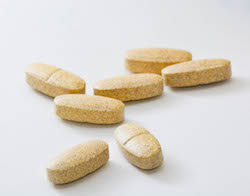“Helps clear toxins from your body*!” “Provides antioxidant protection against free radicals*!” “Formulated for sports players*!” Many supplements claim to be helpful products that protect or enhance your health. However, these claims come with a little asterisk (*) and a statement that the claims have not been verified. But if a product has made it to the shelf, they must at least be safe, right?

This is the case for medications. These drugs are highly regulated, with major requirements for creating, labeling, and selling drugs. These steps all require lengthy clinical and laboratory testing. Medications must be found to be effective and safe before they can be sold. However, this is not true for vitamins.
Currently, there are no standards or regulations for multivitamins, such as what nutrients they must contain and in what amounts. Manufacturers determine the types and amounts of vitamins, minerals, and other ingredients that multivitamins contain. Because vitamin supplements are not treated as drugs, the Food and Drug Administration (FDA) is not authorized to judge how effective or safe a supplement is before it can be sold.
Under current law, supplements are assumed safe until shown otherwise. They are not removed from shelves until after injuries to users occur. Once supplements are for sale, any serious events reported by customers or health care professionals must be reported to the FDA. In general, the FDA’s role with a supplement begins after the product is for sale, so it takes significant user harm to start investigations of products that may be unsafe. This can leave a lot of room for bad products to be sold.

Most once-a-day multivitamins are not always made consistently, but many contain all or most of the recognized vitamins and minerals. Generally, they provide levels close to the amounts recommended for humans to get on a daily basis. There are formulations (like recipes) for children, adults, men, women, pregnant women, and senior citizens. Each formulation typically provides different amounts of the same vitamins and minerals based on the needs of these populations. Some products contain a higher concentration of vitamins and minerals than what is recommended or might include other nutritional and herbal ingredients.
Unfortunately, supplements can contain cheap materials that have no benefit and they may include contaminants. Manufacturers may not even list ingredients on the product. We might have no way of knowing what is used unless it is third-party verified. So how can you find quality vitamin supplements?
Additional images via Wikimedia Commons. Image of women playing soccer by Ad.jordan.
Read more about: Vitamins: Vital or Not?
Bibliographic details:
- Article: Are Vitamins Safe?
- Author(s): Dr. Biology
- Publisher: Arizona State University School of Life Sciences Ask A Biologist
- Site name: ASU - Ask A Biologist
- Date published:
- Date accessed:
- Link: https://askabiologist.asu.edu/vitamin-regulation
APA Style
Dr. Biology. (). Are Vitamins Safe?. ASU - Ask A Biologist. Retrieved from https://askabiologist.asu.edu/vitamin-regulation
Chicago Manual of Style
Dr. Biology. "Are Vitamins Safe?". ASU - Ask A Biologist. . https://askabiologist.asu.edu/vitamin-regulation
Dr. Biology. "Are Vitamins Safe?". ASU - Ask A Biologist. . ASU - Ask A Biologist, Web. https://askabiologist.asu.edu/vitamin-regulation
MLA 2017 Style

Be Part of
Ask A Biologist
By volunteering, or simply sending us feedback on the site. Scientists, teachers, writers, illustrators, and translators are all important to the program. If you are interested in helping with the website we have a Volunteers page to get the process started.

